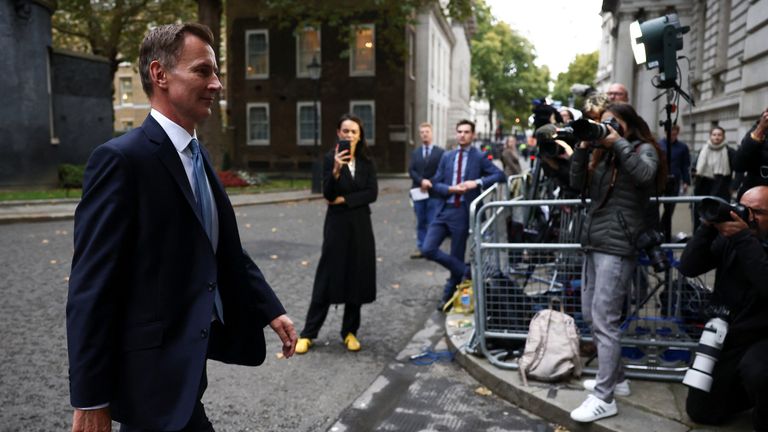The pound and UK government bond yields have recovered in anticipation of a key statement from the new chancellor tasked with sorting out the fallout from the government’s disastrous mini-budget.
Sterling had fallen to a record low against the dollar at the end of September, after the short-lived then chancellor Kwasi Kwarteng unveiled the biggest programme of tax cuts for 50 years.
Mr Kwarteng, who was sacked on Friday after just 38 days in the job, paid the price for a giveaway that called into question the government’s economic credibility on financial markets.
The mini-budget led not just to a collapse in the value of the pound, but also prompted a surge in borrowing costs – forcing an unprecedented intervention by the Bank of England (BoE).
However, following the prime minister’s announcement on Friday that Mr Kwarteng had been sacked and that corporation tax would rise to 25% from April next year instead of being kept at 19%, there was a partial recovery for the UK currency and bond yields.
Mr Kwarteng’s replacement, former foreign and health secretary Jeremy Hunt, has since promised to win back the confidence of the financial markets by fully accounting for the government’s tax and spending plans.
Sterling gained 1.1% to hit $1.1294 on Monday at one stage and also made strides versus the euro when the Treasury revealed that Mr Hunt would deliver key parts of a medium-term plan later on Monday in support of “fiscal sustainability”.
The statement – released before UK financial markets opened – added that Mr Hunt met the BoE governor Andrew Bailey and the head of the Debt Management Office on Sunday night to brief them on the plans.
There would be a select few announcements brought forward from the medium-term fiscal plan that is due to be revealed on 31 October.
The bond markets also suggested an easing of the recent pressure, given additional concerns in some quarters after the BoE on Friday concluded its emergency gilt market support on Friday.
The Bank issued its own statement ahead of the open to say that its operations, aimed at helping pension funds battling higher collateral demands, had enabled a “significant increase in the resilience of the sector”.
It reiterated that other liquidity options remained available, if needed, to ensure smooth financing.
Any rises in government borrowing costs, through a gilt yield rise, would have reflected additional jitters.
‘Unruly pupils are still scheming to oust the beleaguered head’
But there was a downwards shift, with both the UK 20 and 30 year yields falling by more than 30 basis points in early trading.
Susannah Streeter, senior investment and markets analyst at Hargreaves Lansdown, said other risk factors remained at play despite the initial recovery.
”New chancellor Jeremy Hunt has the air of a troubleshooting teacher brought in to turn around a failing school and faces his first big presentation test today with an emergency budget plan wheeled out to try and calm financial markets.
“This is all part of his charm offensive to instil confidence in the government’s ability to be fiscally responsible, but behind him unruly pupils are still scheming to oust the beleaguered head,” she wrote.
Can Truss remain PM?
It reflects a renewed focus on whether Ms Truss, the architect of the government’s initial economic strategy, can remain in the job.
A Tory MP told Sky News: “The idea that the prime minister can just scapegoat her chancellor and move on is deluded.
“This is her vision. She signed off on every detail and she defended it.”
The Conservative Party is now on its fifth chancellor in the past three years – Mr Hunt, Mr Kwarteng, Nadhim Zahawi, Rishi Sunak and Sajid Javid.


